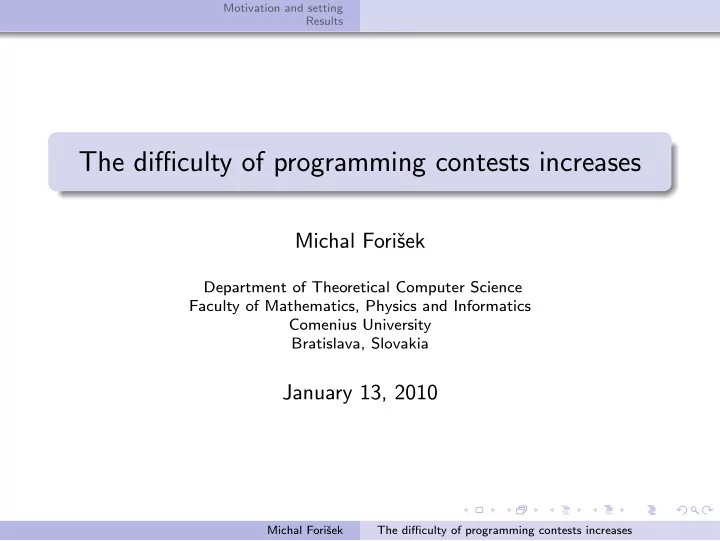

Motivation and setting Results The difficulty of programming contests increases Michal Forišek Department of Theoretical Computer Science Faculty of Mathematics, Physics and Informatics Comenius University Bratislava, Slovakia January 13, 2010 Michal Forišek The difficulty of programming contests increases
Motivation and setting Results Goals and motivation What do we want? Research the difficulty of programming contests. Why bother? Better understanding helps us do a better job. Is this even worth researching? Intuition is easy, proving it may be surprisingly hard. See motivational example that follows. Michal Forišek The difficulty of programming contests increases
Motivation and setting Results IOI Medal Boundaries last gold last silver last bronze 600 500 400 300 200 100 0 1998 1999 2000 2001 2002 2003 2004 2005 2006 2007 2008 Michal Forišek The difficulty of programming contests increases
Motivation and setting Results Prior research Manual task classification Skiena and Revilla (2003) Programming challenges Kiryukhin and Okulov (2007) Methods of Problem Solving in Informatics Verhoeff (2009) 20 Years of IOI Competition Tasks Item Response Theory Kemkes, Vasiga, Cormack (2006) Objective Scoring for Computing Competition Tasks Forišek (2009) Using Item Response Theory to Rate (Not Only) Programmers Michal Forišek The difficulty of programming contests increases
Motivation and setting Results Four main results 1 The set of topics is growing. 2 The topics previously considered difficult now appear early. 3 The difficulty of programming contest tasks increases. 4 The skills of (both top and average) contestants increase. Michal Forišek The difficulty of programming contests increases
Motivation and setting Results Survey of NWERC median tasks respondents: 33 contestants from more than 20 countries question: order a subset of these tasks according to difficulty 0 1 2 3 4 5 6 7 8 9 10 11 internet/0 0 0 1 2 0 0 1 0 2 0 0 space/1 27 20 11 18 8 8 5 3 12 5 5 papergirl/2 23 5 8 11 6 6 5 3 8 4 6 railroads/3 21 14 16 19 12 12 9 6 8 6 8 dates/4 24 6 15 6 8 7 6 4 9 5 5 floors/5 24 15 15 12 17 10 7 7 13 6 8 boss/6 23 14 15 10 13 12 4 5 9 6 8 taxicab/7 22 17 15 15 18 14 15 15 13 14 13 tantrix/8 24 20 21 18 22 15 16 8 19 13 11 setstack/9 21 10 13 13 18 10 11 7 5 10 9 escape/10 26 20 17 16 20 15 15 7 11 13 14 mobile/11 22 15 16 13 18 12 12 7 10 12 7 Michal Forišek The difficulty of programming contests increases
Motivation and setting Results Dynamic Programming at TopCoder div2 easy div2 hard div1 medium div2 medium div1 easy div1 hard 0.6 0.5 0.4 0.3 0.2 0.1 0 2003-h1 2003-h2 2004-h1 2004-h2 2005-h1 2005-h2 2006-h1 2006-h2 2007-h1 2007-h2 2008-h1 2008-h2 2009-h1 Michal Forišek The difficulty of programming contests increases
Motivation and setting Results Graph Theory at TopCoder div2 easy div2 hard div1 medium div2 medium div1 easy div1 hard 0.5 0.4 0.3 0.2 0.1 0 2003-h1 2003-h2 2004-h1 2004-h2 2005-h1 2005-h2 2006-h1 2006-h2 2007-h1 2007-h2 2008-h1 2008-h2 2009-h1 Michal Forišek The difficulty of programming contests increases
Motivation and setting Results ACM ICPC: towards faster algorithms Single-source shortest paths (Dijkstra’s algorithm): date N M comment 2002-04-20 1 000 requires preprocessing 2002-07-27 200 2nd shortest walk 2004-10-16 1 000 10 000 k shortest walks 2005-09-24 1 000 number of shortest paths 2006-01-21 20 000 50 000 2007-12-01 100 000 1 000 000 2009-07-18 10 000 100 000 additional complications Michal Forišek The difficulty of programming contests increases
Motivation and setting Results TopCoder: towards more and faster solvers Division 1 easy task (evaluating voting ballots) year solved best time avg time 2003 85/160 (53.13%) 0:07:07 0:23:01 2008 469/583 (80.45%) 0:02:48 0:16:59 Division 1 hard task (max flow/min cut) year solved best time avg time 2003 11/138 (7.97%) 0:21:45 0:35:51 2007 102/385 (26.49%) 0:02:44 0:18:13 Michal Forišek The difficulty of programming contests increases
Motivation and setting Results Conclusions and questions Tasks are getting harder, contestants are getting better. Clearly, one influences the other. A virtuous circle or a vicious one? When and how will the process stop? Should we attempt to influence it? Answering these needs much more research, we only made the first few steps here. Michal Forišek The difficulty of programming contests increases
Recommend
More recommend